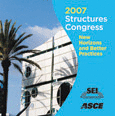Rotation Capacity of Pre-Qualified Moment Connections: A Yield Line Approach
Publication: Structural Engineering Research Frontiers
Abstract
Steel moment connections in the US have been placed under very close scrutiny after the 1994 Northridge earthquake because of their unexpectedly poor performance. These investigations summarized in the FEMA-350 report produced design recommendations for new steel moment-resisting frame structures. At the core of these design recommendations is requirement that connections in Special Steel Moment Resisting Frames (SMRF) have a total rotation capacity exceeding 4% radian while maintaining strength above the nominal plastic capacity of the beam or loosing no more than 20% of the maximum connection resistance. To demonstrate this, a pre-qualification test requirement was imposed. Each new connection type is required to pass a series pre-qualification test conducted using a prescribed procedure. Such pre-qualification test approach was adopted and codified in FEMA-350 and AISC documents because rotation capacity of steel moment connections could not be reliably predicted using conventional analytical models, such as finite element or fracture mechanics models. Even though this approach is safe, it is expensive and it hampers development of new connection designs. During a severe earthquake only few cycles of large deformation may be sufficient to cause failure of steel structural components sensitive to low-cycle fatigue. Failure of pre-qualified steel moment connections after only a few cycles of high-amplitude deformation was observed in pre-qualification tests as ductile tearing of the metal in the creases of the beam buckled shape in the plastic hinge region. While low-cycle fatigue resistance is not an explicit requirement of the connection pre-qualification test procedure, resistance to this failure mode is important for seismic structural design because steel structures may have to endure a number of significant earthquakes, each having a few cycles of large deformation demand that may pose a cumulative connection fracture risk. In this paper we propose and develop a simple analytical method to predict failure of connections due to buckling and low-cycle fatigue and estimate their seismic rotation capacity in special steel moment resisting frames under both monotonic and cyclic loading conditions. The proposed method uses a plastic collapse approach and a yield-line model of a beam plastic hinge. A so-called yield-line plastic hinge (YLPH) model was developed to model local buckling of a beam in a moment connection. This approximate method was based on interpretation of experimental evidence on the shape of the buckled plastic hinge region. Both strength degradation failure induced by local buckling of beams and low-cycle fatigue failure caused by plastic strain accumulation at critical points in the plastic hinge region were considered. Then, YLPH models for common US post-Northridge connections, such as the WUF-W, the RBS and the Free Flange connection, were constructed and applied to compute their seismic rotation capacity to validate them by comparisons to experimental data.
Get full access to this article
View all available purchase options and get full access to this chapter.
Information & Authors
Information
Published In
Copyright
© 2007 American Society of Civil Engineers.
History
Published online: Jun 20, 2012
ASCE Technical Topics:
- Concrete
- Connections (structural)
- Continuum mechanics
- Dynamics (solid mechanics)
- Engineering materials (by type)
- Engineering mechanics
- Forensic engineering
- Frames
- Material failures
- Materials characterization
- Materials engineering
- Moment (mechanics)
- Motion (dynamics)
- Plastic hinges
- Reinforced concrete
- Rotation
- Solid mechanics
- Statics (mechanics)
- Steel frames
- Steel structures
- Structural engineering
- Structural failures
- Structural members
- Structural systems
- Structures (by type)
Authors
Metrics & Citations
Metrics
Citations
Download citation
If you have the appropriate software installed, you can download article citation data to the citation manager of your choice. Simply select your manager software from the list below and click Download.
